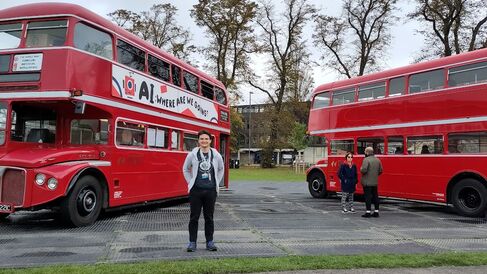
With the UK’s AI Summit taking place in London on the first week of November, ICCS has participated in an initiative that invites the public to speak about their hopes and fears regarding AI.
In a collaborative effort to involve members of the public in conversations with scientists, Cambridge University’s ai@cam, the Accelerate Programme for Scientific Discovery and the Kavali Centre for Ethics, Science and the Public have created conversation “labs” within custom-decorated double-decker buses.
Different desks were themed by the use of AI in various fields such as health or education. Our research software engineer Jack Atkinson represented climate and environment, talking about the use of AI in his everyday work:
"It was really enlightening to step out of the academic bubble and discuss AI with members of the public from a variety of backgrounds. Seeing how they view AI, the parallels between their hopes and concerns and ours as researchers, but also the differences due to the way AI is often anthropomorphised in the media was interesting to discuss."
AI is developing fast and there are concerns about developing both ethical and constructive regulations around its use. The London Summit will focus on mitigating potential risks. Speaking to people who develop and use AI tools in their work is thus important to fully understand how it works.
Jack reflects on his conversations:
"I'm not sure if I swayed any "hopes and fears" either way - and still have both myself, but would like to think I improved the understanding of how AI really works and dispelled a few myths. This sort of engagement with the public, who fund a lot of our research, is important."
Based in London? Find out more for yourself on Wednesday November 1st from 10am to 4pm at the Living Centre, located next to the British Library.
